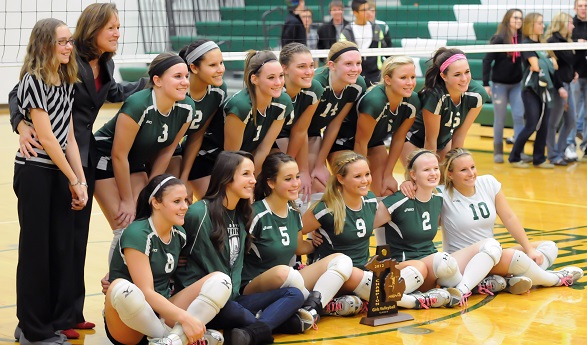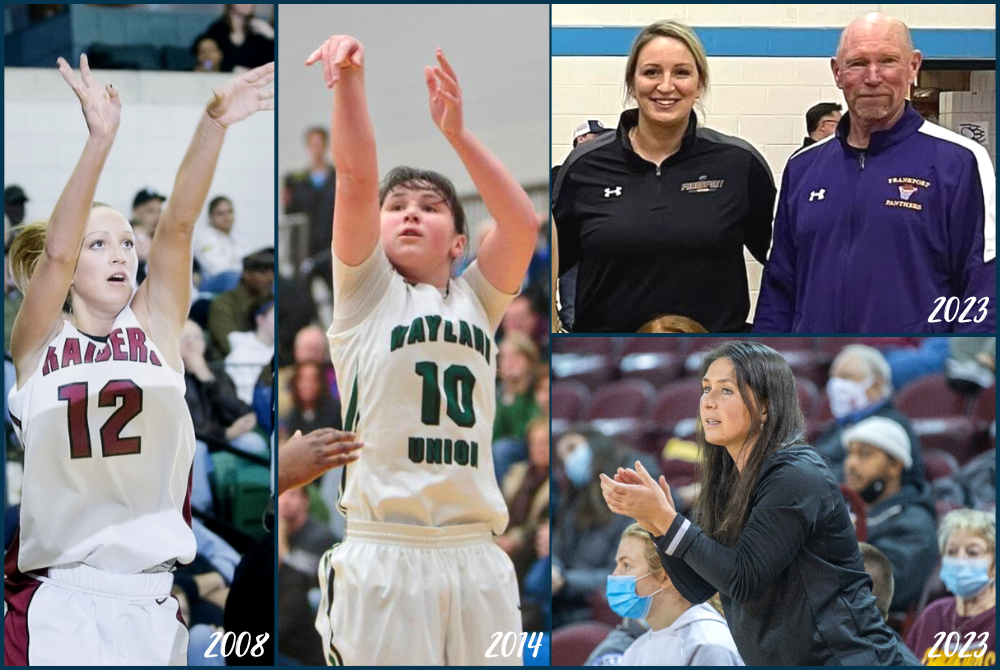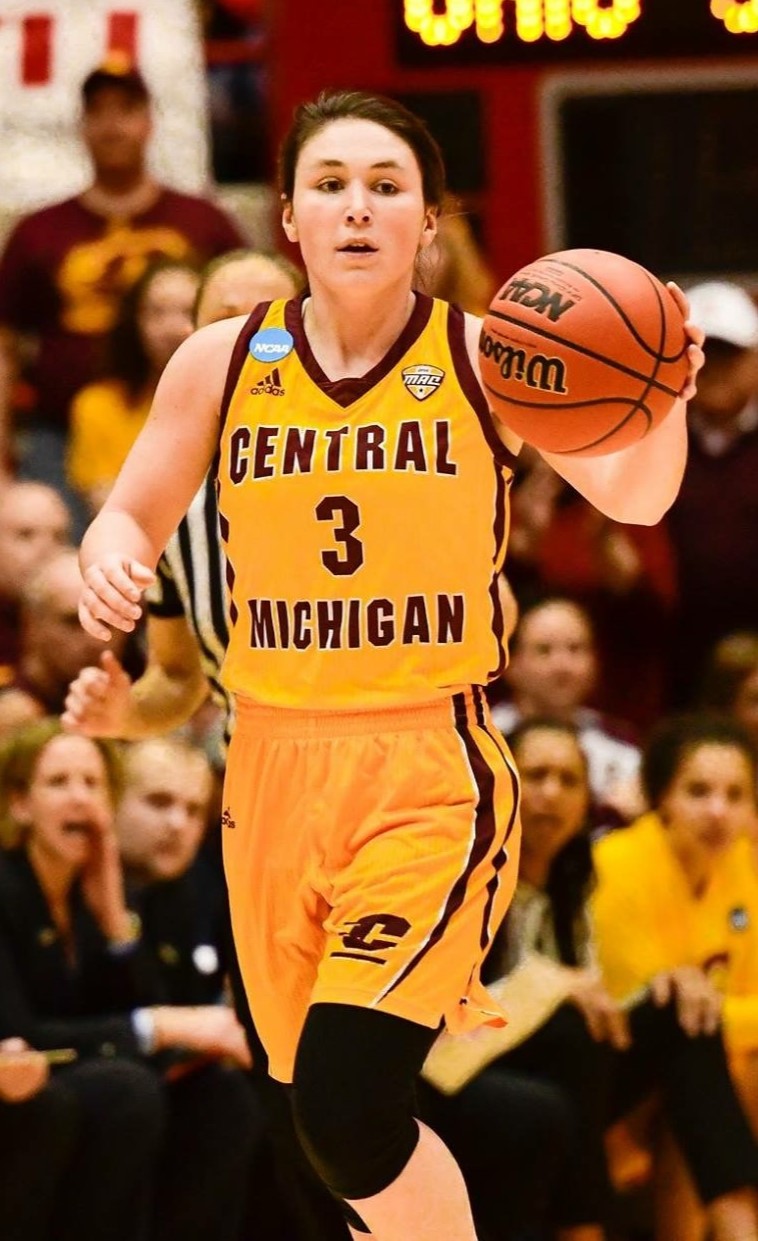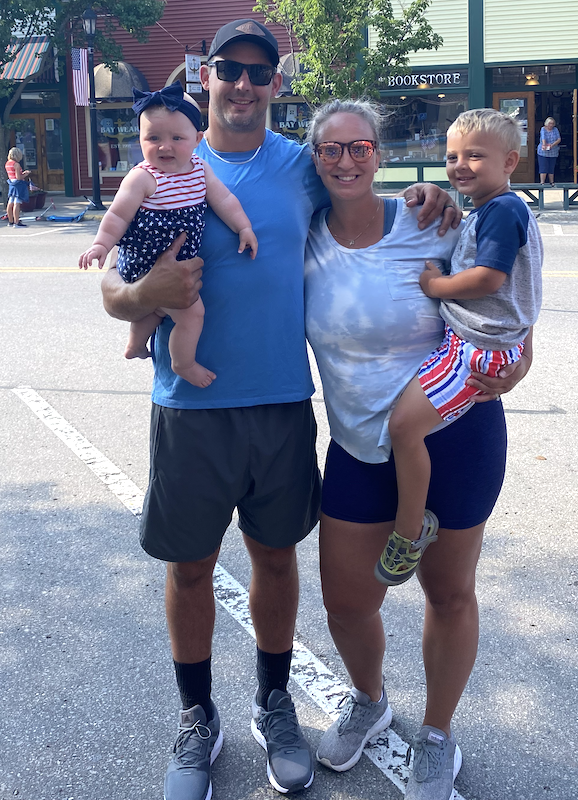
Wise Words for Coaches New (and Old)
September 13, 2013
By Geoff Kimmerly
Second Half editor
Every fall brings a new beginning for those who live by the high school calendar. And among those experiencing a new start are first-year high school coaches eager to begin their careers in educational athletics.
But what knowledge do they bring into their first coaching jobs? Most if not all played at the high school level, and many played at the college level as well. Some have served as assistants or coached youth teams. But high school coaching comes with its own set of challenges requiring an advanced set of skills – skills that are passed on annually as part of the Michigan High School Athletic Association’s Coaches Advancement Program.
To assist in giving some of our new coaches a running start, we tapped into the knowledge of three of our Coaches Advancement Program instructors for advice they give those just starting out:
 Jean LaClair began this fall 12th in MHSAA volleyball history with 861 wins since becoming a varsity head coach in 1987. She’s coached at Midland Dow, Pinconning and currently Bronson, where she’s also the athletic director and an assistant principal. She’s also served as an MHSAA official and contributed to the Women in Sports Leadership porgram.
Jean LaClair began this fall 12th in MHSAA volleyball history with 861 wins since becoming a varsity head coach in 1987. She’s coached at Midland Dow, Pinconning and currently Bronson, where she’s also the athletic director and an assistant principal. She’s also served as an MHSAA official and contributed to the Women in Sports Leadership porgram.
 Ken Semelsberger is a recent inductee into the Michigan High School Football Coaches Hall of Fame and spent 33 years at Port Huron High School as a coach and athletic administrator. He also coached football at Detroit Servite and has led teams in basketball, softball and baseball. Semelsberger returned to the Port Huron sideline four seasons ago as the varsity’s line coach.
Ken Semelsberger is a recent inductee into the Michigan High School Football Coaches Hall of Fame and spent 33 years at Port Huron High School as a coach and athletic administrator. He also coached football at Detroit Servite and has led teams in basketball, softball and baseball. Semelsberger returned to the Port Huron sideline four seasons ago as the varsity’s line coach.
 Penny Allen-Cook currently is an athletic consultant and in her fourth season coaching the Freeland varsity volleyball team. She also coached volleyball at Alma College, and is a former assistant commissioner of the Great Lakes Intercollegiate Athletic Conference. She served as an assistant athletic director at Alma College and director of compliance at Saginaw Valley State University.
Penny Allen-Cook currently is an athletic consultant and in her fourth season coaching the Freeland varsity volleyball team. She also coached volleyball at Alma College, and is a former assistant commissioner of the Great Lakes Intercollegiate Athletic Conference. She served as an assistant athletic director at Alma College and director of compliance at Saginaw Valley State University.
All were asked the following questions during separate interviews. But not surprisingly, some of their answers were similar – especially those that emphasized dealing with parental pressures and why they as coaches continue to return to the sideline every year.
Many of their answers also segued well into each other, so we’ve blended them for one longer conversation filled with wisdom beneficial to new and veteran coaches alike.
What do you tell those who are interested in becoming high school coaches?
Semelsberger: “Basically, it’s one of the most fulfilling things you’ll ever do. And it’s also one of the hardest things you’ll ever do. I try to explain that it’s not just about going to practice and coaching kids today. That’s the easy part. It’s also preparing for practice, (gaining) the knowledge of what to do in certain situations from the game itself all the way to training procedures, injury procedures and liability issues. That’s all part of the coaching realm.”
LaClair: “My biggest concern with young coaches is them getting driven out by parents really early. You’ve got to have thick skin, and you’ve got to have great relationships with parents. You can’t be afraid to talk to parents.”
Allen-Cook: “Certainly to coach is an extremely rewarding thing to do. But you can’t get into it for the money. You get into it for the things that last for a lifetime. My first year I started coaching was back in 1986, and I’ve kept in touch with those kids. (Coaching) can’t be for money or wins and losses, but the differences you make in lives.”
Semelsberger: “Probably not until after the first year do you realize all that’s entailed in coaching. (Coaches) say, ‘Once I really got into and do it, after the first time, it was a lot more than I thought.’ They say, 'What can you tell me to help me?'”
How do you encourage coaches who have become frustrated with the profession?
Allen-Cook: “It’s easier to get discouraged nowadays more than it used to be, and a common thing that discourages is the parent involvement is at a different level than it ever was 20 years ago. The key is to remember, and it’s hard for young coaches who aren't parents, but you tell them to step back and imagine what it feels like if you were the parent.”
LaClair: “I do try to get all young coaches a mentor, someone to talk with. We all get frustrated; we all have to vent, and we need the right person to talk it through with and come up with alternative ways (of dealing with situations).”
Semelsberger: “The one thing I tell them is to remember that what’s most important out there is how they influence athletes. I want to see them doing positive things with our athletes, stressing grades and sportsmanship. I hired a hockey coach once, and I told him to clean up the program. I don’t care if you win; I want our grades to be good, community involvement, and the wins and losses will come. If you stay with it, hang in there, it will come.”
Allen-Cook: “If they approach things the right way, in as few years as four or five, if they stick it out, they’ll learn the positives outweigh the negatives. I’m always encouraging them to stick it out a few more years until they can figure out their true philosophy, why they want to coach.”
What specific situations do you tell new coaches to prepare for, and how?
LaClair: “For me as a coach, the parent/athlete meeting is mandatory. If a parent comes to me with a question during the year, I say, ‘Do you remember the parent/athlete meeting? We discussed that.’ It sets the tone and tells parents how proactive you are as a person, how organized and prepared you are.”
Semelsberger: “When you’re not coaching, when you’re sitting in the stands, the parents are friendly. But once you’re on the sideline, now you’re the coach, and that changes the dynamic of the relationship dramatically. I explain to (coaches) that my philosophy is I’m dealing with parents’ most precious item. You want to treat each one of those children like you’d want your kids to be treated. You don’t have to play everyone all the time, but treat (athletes) with respect, talk to them and let them know what’s going on, why a kid isn't playing, so the kid has an idea what’s going on.”
Allen-Cook: “One of the best defenses is to be a student of whatever the game is they’re coaching so they can be seen as an expert all the time. Show it by going to clinics, reading up on things, and coming to practice with a true plan of what you’re doing every day. Parents are less likely to question if you know what you’re doing and they can see you’re a true student of the game and come every day prepared.”
LaClair: “Time management is critical. Especially for me, you need to have good practice plans, well thought out in advance so kids aren't standing around at all.”
Semelsberger: “Sometimes I tell (coaches) about reporters if the sport has a lot of reporters; always be positive, don’t be negative. ... (Also) I make sure they understand and follow the rules. Academics are the most important thing, so make sure every kid is eligible. And I tell them the most important people are secretaries and custodians. Get them on your side, and they’ll do anything for you.”
What advice do you offer coaches who also are balancing teaching or other jobs at the school?
LaClair: “Just over half of my (teachers are coaches), and that’s great. You can build a different type of relationship.”
Semelsberger: “Their number one job is being a teacher, and that’s always been the number one job. They can’t let the fact they coach take away from that. Classes are number one, and coaching comes after that.”
LaClair: “You have to think days and weeks ahead. I tell coaches who are also teachers that the weekends and a lot of Sundays are going to be for making lesson plans for the week, practice plans for the week. Then all they have to do is tweak them. Have a good plan and all you have to do is tweak, and you don’t have to do that for two hours on a Thursday night.”
Allen-Cook: “It’s a neat experience to be able to teach in other realms (like athletics). Unfortunately there are less and less teacher coaches.”
What keeps you coming back to coaching?
LaClair: “The kids. A lot of people think social media is an evil beast, and it can be. But what I love about it is I've been coaching a long time and I can keep up with former athletes all over the country, see baby pictures, things I wouldn't be able to do without social media.”
Allen-Cook: “I think once you’re a coach, you’re always a coach. It’s tough to get out of your blood. I enjoy the interaction with the young people. I’m an independent contractor now (Allen-Cook also has taught) so I have little interaction with student athletes anymore. It feels rewarding that in some way I’m having a positive impact.”
Semelsberger: “The kids, the athletes, just to watch them develop as human beings. We work hard with on our athletes being leaders in the (school) building; the first day of school our senior and junior football players were helping out the freshmen. If a kid was scared or something, trying to get where they needed to go, we had jerseys on and they knew if they saw a kid with a jersey on they could ask for help. To see those kids take on those roles ... I love watching the ninth graders come in as scared little kids and watch them leave as confident seniors going on to college or work or whatever they’ll do.”

PHOTOS: (Top) Penny Allen-Cook (second from left, back row) and her Freeland volleyball team celebrate last season's Class B District championship. (Click to see more from High School Sports Scene.) (Below) Bronson volleyball coach Jean LaClair speaks with some her players during one of her more than 1,000 games as a varsity head coach. (Photo courtesy of the Sturgis Journal.)

Frankfort Hoops Staff Bolstered by Past Stars Giving Back in Banktson, Kreski
By
Tom Spencer
Special for MHSAA.com
July 18, 2023
Veteran Frankfort girls basketball coach Tim Reznich will have a couple of true superstars on his bench this winter.
 They don’t have MHSAA eligibility remaining, but they should really help the Panthers. They’ve used up their college eligibility as well.
They don’t have MHSAA eligibility remaining, but they should really help the Panthers. They’ve used up their college eligibility as well.
They are Lindsey (Pettit) Banktson, a 2008 graduate of Portland High School and all-state forward, and Presley (Hudson) Kreski, a 2014 product of Wayland High School and all-state guard. And, they are now serving as assistant coaches for Frankfort.
Banktson has been on Reznich’s bench 10 years, and Kreski is headed for her first at Frankfort. Kreski has been on women’s basketball coaching staffs at Western Michigan University and Central Michigan University since her playing days.
“I have always felt very fortunate in my situation at Frankfort,” Reznich said. “I have felt like we have always been able to provide our players with the resources and opportunities to excel at basketball, if that is what they wanted to do.
“When Lindsey came those resources increased, and now adding Presley to the mix just brings everything over the top,” he continued. “Our players are already starting to realize it.”
Kreski, who will be teaching health and physical education at Frankfort, and Banktson, now a physician assistant with Crystal Lake Clinic, are excited to work together and with Reznich this winter as he begins his 22nd season at the helm of the Panthers.
“I’ve loved coaching with Rez the past 10 seasons and am just as excited for season number 11,” said Banktson, who went on to play basketball and softball at Ferris State University. “Every year, the night before our first day of practice, is always like Christmas Eve for me.
“I can’t sleep and I can’t wait for my alarm to go off to head to the gym to start our 2-a-days,” she continued. “I am so grateful to coach with Rez and learn from him.”

Kreske too is eager to work with Rez after getting involved with the Panthers in summer ball.
After Wayland, Kreski went on to an illustrious playing career Central Michigan where she won the NCAA 3-point contest in 2019. She also played with the Seattle Storm of the WNBA before playing professionally overseas in Poland.
“I am really excited to be at Frankfort and helping the team out,” Kreski said. “The girls work really hard and want to get better.
“Tim is a great coach, and I am looking forward to working with him and sharing my knowledge of the game as well as learning from him.”
Frankfort is coming off a District championship in 2022 and a District title loss to eventual Division 4 champion Glen Lake in 2023.
Reznich says the Panthers have already noted keys to success just by being around Kreski and Banktson. Reznich, who guided Frankfort to back-to-back Class D championships in 2005 and 2006, admits he may have softened up a bit on his players over the years. Conditioning will be a top priority this year.
“They (Kreski and Banktson) have the first-hand experience of the benefits of pushing yourself hard and not cutting corners,” Reznich said. “Our players will be in the best shape of their lives when those two are finished with them.”
And Banktson is happy to pass on her high school experience to the Panthers. She graduated in 2008 as the Lansing State Journal’s “Female Prep Athlete of the Year” after shining in three sports and leading Portland to the season’s final weekend in two.
“As a player, high school athletics taught me a lot about hard work and dedication,” she said. “High school sports taught me that you have to put in the extra work if you want to be great.
“You have to be in the gym getting extra shots outside of practice, you have to be at the field getting extra reps on the weekends,” she continued. “If you work hard and give everything you’ve got to develop your game, you will be successful.”
Kreski recalls fondly her high school days working hard and having fun with her friends and teammates, along with making deep runs in the tournament.
“High school sports is the truest form of competition,” Kreski said. “It starts with a community who supports everyone from a young age and involves all the friends and family you grew up with.
“High school sports help guide young people into leaders, teaching them how to work hard and be disciplined.”
Kreski led CMU to Sweet 16 her junior year. She is the all-time leading scorer at CMU (2,309) and career assist leader (643). Central won the Mid-American Conference three times during her days with the Chippewas. She married Gage Kreski after that chapter of her career was done.
Banktson met her husband Max Banktson at Ferris State, where he played football. They moved to Frankfort, where Max was born and raised. They have a 3-year-old son named Briggs and a 6-month old daughter named Landyn.
Both Reznich and Banktson express respect and appreciation for their coaching together. They’ve been on the same page with game plans and scouting reports, and they expect it will continued with Kreski aboard.
“Rez and I really work well together,” Banktson said. “He has always respected me as a player and coach and has given me so much autonomy with our teams.
“He is always open to my input when it comes to running certain drills in practice, putting in new offenses, or adding defensive schemes,” she continued. “He trusts me to handle our subbing during games.”
Reznich agrees.
“I have always appreciated Lindsey’s perspective on what the girls are doing on the court,” he said. “It is going to be a lot of fun and exciting to add Presley’s ideas.
“We have always treated the regular season as practice for the tournament, making adjustments and tweaking things,” he continued. “I can’t wait to see the end product this year.”
 Banktson was a three-sport, four-year varsity player at Portland earning a combined 12 varsity letters in basketball, softball and volleyball. She helped the Raiders win league, District and Regional titles. Her teams reached MHSAA Semifinals for softball twice and basketball once.
Banktson was a three-sport, four-year varsity player at Portland earning a combined 12 varsity letters in basketball, softball and volleyball. She helped the Raiders win league, District and Regional titles. Her teams reached MHSAA Semifinals for softball twice and basketball once.
It doesn’t take much to get her back in game mode.
“I can still remember the feeling of adrenaline getting ready in the locker room with my teammates, running out to our warm up music, and battling on the court each game,” she said. “I am thankful for my teammates who, when on the court, were so unselfish. We just wanted to win.”
She hopes to continue to instill greatness in the Panthers.
“I always tell the girls, ‘We were tough’ — not just physically but mentally,” she said. “We had a type of swagger – we played like we knew the bullseyes were on our back, and every game we had to fight to stay at the top.
“We took pride in wearing that Portland Raider jersey,” she continued. “I just want to instill that same mental toughness and swagger into my girls here at Frankfort.”
Having a pair of women who played now coaching and serving as mentors is beneficial on a personal level as well.
“I feel like I can relate to players on a personal level,” Banktson said. “I always try to be a good role model for them and someone they can come to with anything.
“I’m their biggest cheerleader but also not afraid to hold them accountable and help steer them down the right paths of life.”
And Banktson has learned how she might have coached herself.
“I would push myself to continue to work on my right hand, because everyone in the gym knows I’m a lefty,” she said with a smile.
2023 Made In Michigan
July 12: Championship Memories, High School Tennis' Impact Stick with Hackett Pair - Read
July 6: Brother Rice Finals Hero Aiming to Ace Family Life, Financial World - Read
July 5: Lapeer West 4-Time Finals Winner Set to Build Champions at Oklahoma - Read
PHOTOS (Top) Lindsey Banktson plays at Portland in 2008 and stands for a celebratory photo with Frankfort’s District champion last season. Presley Kreski plays for Wayland in 2014 and more recently served on Central Michigan's coaching staff. (Middle) Kreski directs the offense during her time at CMU. (Below) The Banktson family: From left, Landyn, Max, Lindsey and Briggs. (Photos of Banktson courtesy of Lindsey Banktson. CMU photo courtesy of CMU sports information. Wayland photo courtesy of Joel Bissell, MLive.com)

